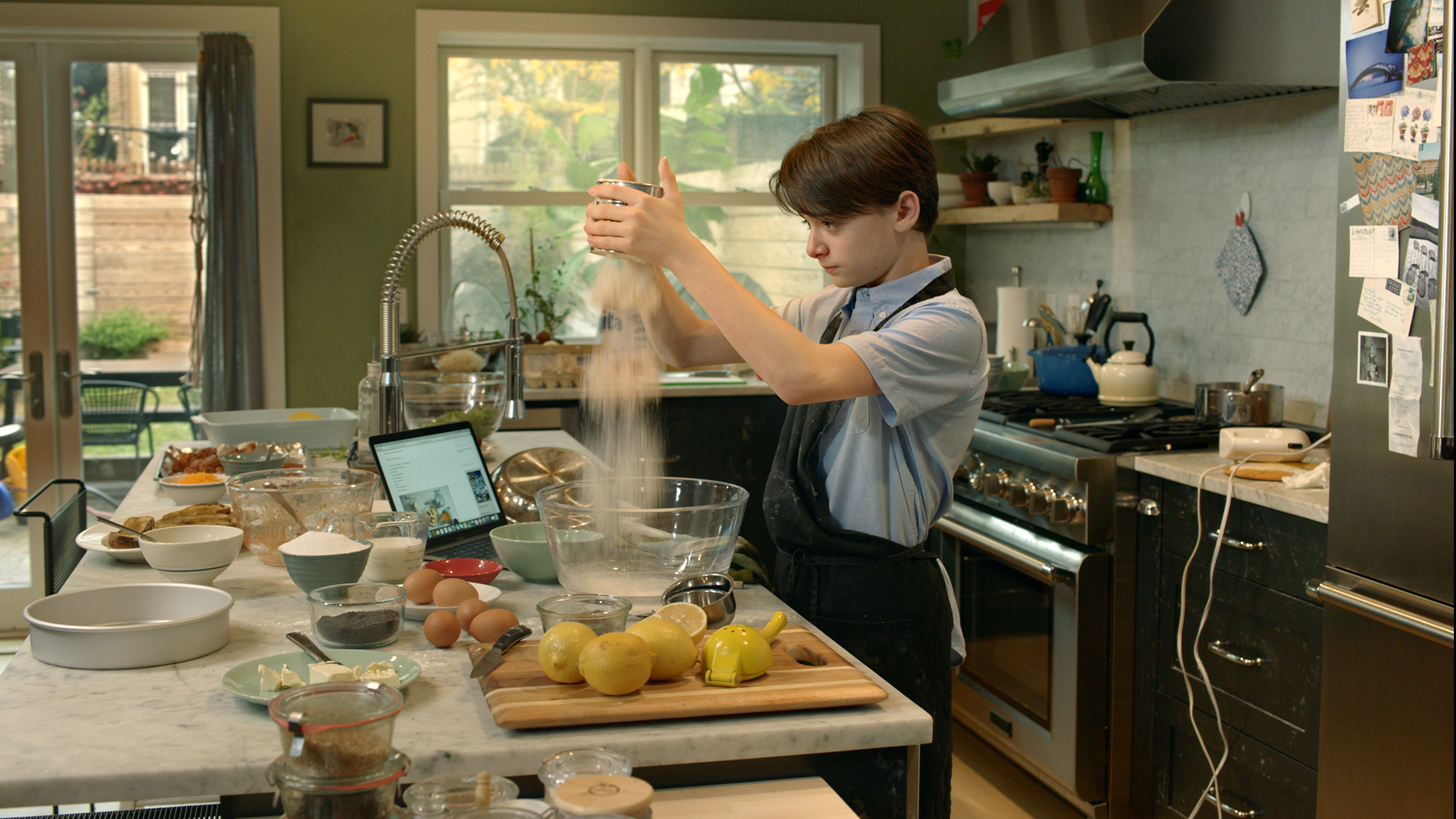 Noah Schnapp in “Abe” Photo courtesy of Blue Fox Entertainment
Noah Schnapp in “Abe” Photo courtesy of Blue Fox Entertainment
For the titular character in “Abe,” a 12-year-old with a Jewish mother, Muslim father, and a passion for food and cooking, family mealtime should be fun. Instead, the dinner table is a war zone, with his Israeli and Palestinian grandparents at constant odds, staking claims to his allegiance and identity. Torn and miserable, Abe finds refuge and a creative outlet in the pop-up kitchen run by an Afro-Brazilian street-food chef, who mentors him and inspires him to unite his warring family through food.
Starring Noah Schnapp (“Stranger Things”) as Abe and musician Seu Jorge as chef Chico, it’s the first scripted feature in English for Brazilian director Fernando Grostein Andrade, whose own life experiences and feelings about religion, identity, social media and divisiveness in the world inspired and informed the story. “If you have a disagreement with someone, you have a greater chance of sorting it out over a good meal than fighting it out on Facebook,” Andrade told the Journal. While religion and politics can divide, “culture and education bring people together,” he said. “Food, music, art, culture and sports can bring the best out of us.”
The son of a Jewish mother and a Catholic father, who died when he was 10, he has a large extended and interfaith family because of remarriages. He began growing orchids as a way to overcome his grief over his father’s death, but changed his protagonist’s talent to cooking in honor of the stepfather who raised him. The 2007 birth of his nephew, the son of his Jewish brother and his Catholic sister-in-law, was another inspiration for an idea that went through many changes along the way.
Andrade brought in Palestinian writers to provide an authentic perspective; hired food consultants for pre-production and on set; and traveled to the Middle East to interview Israeli and Palestinian chefs, farmers and food sellers for background research and a companion documentary, “Flavors.”
“If you have a disagreement with someone, you have a greater chance of sorting it out over a good meal than fighting it out on Facebook.” — Fernando Grostein Andrade
He set “Abe” in Brooklyn, “a beautiful metaphor for the cultural diversity in the world,” with a lively street-food scene. The film’s many cooking sequences required an industrial kitchen and multiples of ingredients in various stages of preparation. This was necessary “for continuity,” Andrade said. “And we made sure the food was good because the actors had to keep eating.”
He praised Schnapp’s talent, professionalism and aptitude for cooking. “We held classes and he was really good,” Andrade said, noting they were careful about giving the teenager sharp knives, per regulations pertaining to minors on set.
Financing was a challenge, resulting in a limited budget that didn’t cover reshoots beyond the original 18 days. Not taking “no” for an answer, “I got some cinema students from São Paulo and we shot in my kitchen for five more days,” he said. Andrade also took a cue from the animated moviemakers at Pixar in two ways: creating an animatic, or animated, storyboard as a shooting guide, and as the inspiration for the film’s tone. “My idea was to do a live-action Pixar movie. They have layers of humor and messages that appeal to different generations,” he said. “The message is universal and can start conversations in families.”
Andrade, whose Jewish maternal grandparents escaped Russia and Poland pre-World War II and emigrated to Argentina and then Brazil, has fond memories of Passover and Rosh Hashanah dinners at their home. “My bar mitzvah was a very important moment in my life,” he said, noting that while he did not experience anti-Semitism, he did face homophobia at school, “even before I knew I was gay.”
Andrade always loved movies, and they became a source of solace during a difficult youth. “I was a teenager struggling with depression and the only place life made sense was in a theater,” he said. He investigated other career paths, including technology and journalism, and majored in business at college before attending a “life-changing” University of Southern California summer film program at age 21.
Known in Brazil for his documentaries about the war on drugs and human rights issues, he’s focusing on scripted projects now. He’s currently living with his husband in Los Angeles while editing “Flavors,” writing a screenplay about a gay couple with an age difference (Andrade is 39, his partner is 22) and working on a book about the origins of homophobia.
“Quarantine makes me more busy,” he said, before noting another effect of the COVID-19 pandemic. “Everybody in the world is rethinking their lives. It took a big tragedy like this to make a lot of people come together. I think we’re having [a] moment of clarity. But why do we wait for things to go so bad in order for us to see what’s in front of our noses?”
Andrade decried the openly racist, homophobic and misogynist rhetoric put forward by Brazil’s leaders that has given rise to censorship and violence, and he hopes “Abe” will serve as a counterpoint. “This movie shows the power of Brazilian cinema, the good things about our country,” its tantalizing cuisine among them, he said. “I don’t think food can stop war, but it’s a path to connect people, and connection is crucial in order to overcome hate and reach understanding.”
“Abe” will be available April 17 On Demand and via digital platforms.





















 More news and opinions than at a Shabbat dinner, right in your inbox.
More news and opinions than at a Shabbat dinner, right in your inbox.